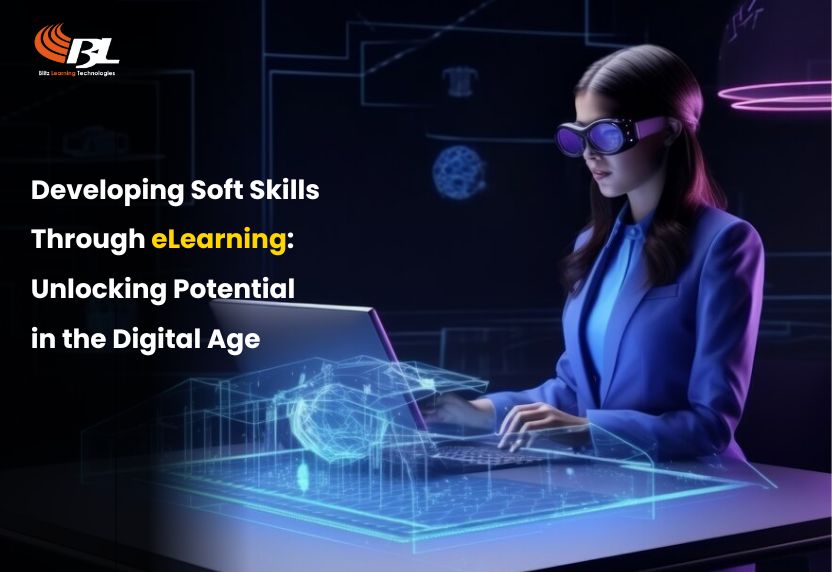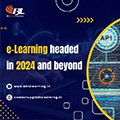
Blog
- Home
- Blog

03Sept
Developing Soft Skills Through eLearning: Unlocking Potential in the Digital Age
Introduction
In today’s fast-paced and ever-evolving professional landscape, the importance of soft skills cannot be overstated. Unlike hard skills, which are specific and technical, soft skills refer to interpersonal attributes and personality traits that determine how effectively we interact with others. They include communication, teamwork, problem-solving, adaptability, and emotional intelligence. While traditionally, these skills were honed through in-person interactions and experiences, the rise of eLearning has opened up new avenues for their development. This blog explores how eLearning is revolutionizing the way we cultivate these essential skills.
The Growing Importance of Soft Skills
In a world where automation and artificial intelligence are increasingly taking over technical tasks, soft skills have become the differentiator that can make or break a career. Employers now prioritize candidates who can collaborate, lead, and communicate effectively. According to LinkedIn’s 2023 Workplace Learning Report, 89% of executives say that soft skills are just as important, if not more so, than hard skills. However, the challenge lies in developing these skills in a remote or digital environment, where face-to-face interaction is limited.
The Rise of eLearning
eLearning has surged in popularity, particularly in the wake of the COVID-19 pandemic, which forced many educational institutions and workplaces to shift online. The flexibility, accessibility, and scalability of eLearning make it an ideal platform for continuous personal and professional development. Initially, eLearning was more focused on technical skills, but there has been a growing emphasis on soft skills training, recognizing the critical role they play in career advancement and organizational success.
How eLearning Fosters Soft Skills
Intelligent Tutoring Systems (ITS) represent another significant application of ML in EdTech. These systems provide students with one-on-one tutoring by simulating the guidance of a human tutor. ML algorithms allow ITS to assess a student’s knowledge, provide instant feedback, and offer hints or additional resources as needed.
1. Interactive Simulations and Role-Playing: Modern eLearning platforms are leveraging technology to create realistic simulations and role-playing scenarios. For instance, a course on leadership might include virtual role-playing exercises where learners must navigate challenging management situations. These simulations provide a safe space to practice decision-making, conflict resolution, and communication, allowing learners to experiment with different approaches and receive instant feedback.
2. Collaborative Learning Environments: Soft skills, by nature, involve interaction with others. eLearning platforms often include collaborative tools such as discussion forums, group projects, and peer reviews. These features encourage learners to work together, share ideas, and provide constructive feedback, mirroring real-world teamwork and collaboration. Through these interactions, learners can develop empathy, active listening, and the ability to work effectively in diverse teams.
3. Gamification and Challenges: Gamification elements, such as badges, leaderboards, and challenges, can motivate learners to engage more deeply with the material. For example, a course on problem-solving might include timed challenges that require quick thinking and creativity. These elements not only make learning more enjoyable but also help develop perseverance, adaptability, and the ability to think under pressure.
4. Self-Paced Learning for Reflection: One of the key advantages of eLearning is that it allows learners to proceed at their own pace. This flexibility gives individuals the time to reflect on what they’ve learned, which is crucial for internalizing soft skills. For instance, after completing a module on emotional intelligence, learners can take time to reflect on their own emotional responses and how they might apply their new knowledge in real-life situations.
5. Personalized Learning Paths: eLearning platforms often use algorithms to personalize the learning experience, tailoring content to individual strengths and weaknesses. This customization can be particularly effective for soft skills development. For example, if a learner struggles with public speaking, the platform might suggest additional resources or practice exercises focused on that area, providing a targeted approach to skill improvement.
The Future of Soft Skills Development
As eLearning continues to evolve, we can expect even more innovative approaches to soft skills development. Artificial intelligence (AI) and virtual reality (VR) are poised to play significant roles in creating even more immersive and personalized learning experiences. Imagine attending a virtual networking event in a VR environment, where you can practice your communication skills with AI-powered avatars in real-time. Such advancements will make soft skills training more effective and accessible than ever before.
Conclusion
The digital age has brought about profound changes in how we live, work, and learn. While developing soft skills online might have seemed challenging in the past, eLearning is proving to be a powerful tool in this area. By offering interactive, collaborative, and personalized learning experiences, eLearning is making it possible for individuals to hone the soft skills that are critical for success in today’s world. As technology continues to advance, the potential for eLearning to enhance our personal and professional growth will only increase, unlocking new opportunities for individuals and organizations alike.
In this rapidly changing world, the ability to adapt, communicate, and collaborate is more important than ever. Through eLearning, we can ensure that these essential skills are developed and refined, preparing us for the challenges and opportunities of the future.

Neti
About authorNeti is a dynamic professional with a diverse background in human resources, operations, and personality development training. Recognized as a transformative leader, she empowers others as a sought-after mentor, leveraging her deep understanding of human behavior. An avid reader and traveler, she applies her global mindset to innovative problem-solving in the e-learning industry, where she leads the development of cutting-edge educational platforms. Her journey exemplifies versatility, resilience, and a commitment to personal and professional growth.



Leave a comments